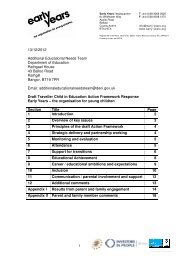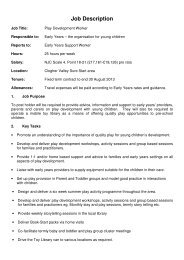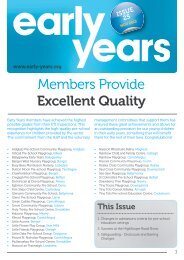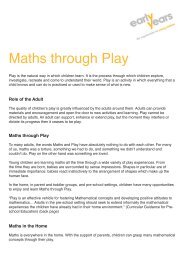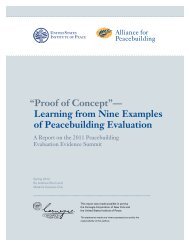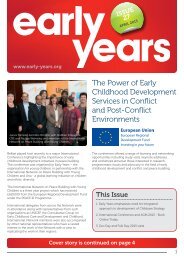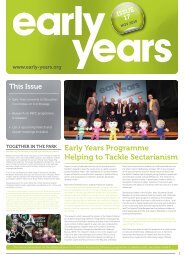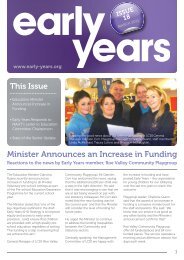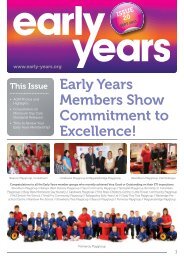Draft Rural White Paper Action Plan – Response Form - Early Years
Draft Rural White Paper Action Plan – Response Form - Early Years
Draft Rural White Paper Action Plan – Response Form - Early Years
You also want an ePaper? Increase the reach of your titles
YUMPU automatically turns print PDFs into web optimized ePapers that Google loves.
<strong>Draft</strong> <strong>Rural</strong> <strong>White</strong> <strong>Paper</strong> <strong>Action</strong> <strong>Plan</strong> – <strong>Response</strong> <strong>Form</strong>Note that responses to the consultation should arrive with DARD not later than close of play on Monday 13 th June 20111. The consultation document sets out a vision for rural areas and associated key policy priorities.a. Do you think the vision for rural areas reflects how you would wish to see the future of rural area? Please comment as appropriate.<strong>Early</strong> <strong>Years</strong> – the organisation for young children works within a strong set of values, including parenting, participation, community and partnership,which place children and their parents and carers at the core of what we do. Therefore the elements of the Departmental vision outlined in the draftdocument relating to vibrant, strong rural communities, strong inter-linkages with urban areas and strong community infrastructures to avail ofeconomic, social and cultural opportunities are promising. Our vision is that children are strong, competent and visible in their communities; physicallyand emotionally healthy; eager and able to learn and respectful of difference. The principles contained in our vision transcend age boundaries and, inthese respects, the vision contained in the draft document does not fully capture elements relating to the quality of life of residents in our ruralcommunities of all ages. Inclusion of these elements would also assist the department and the action plan in efforts to secure and encourage crossdepartmental co-operation as they cover a variety of remits and responsibilities.b. Do you think there are other policy priorities which should be included? If so, please specify which and explain why.It is appreciated that the policy priorities are designed to act as a further step in developing the overarching vision towards more defined actions. Thedraft document outlines policy priorities relating to development of infrastructure systems; promotion of fair and equitable access to key services;promotion of tolerance, health, well-being and inclusion and minimising disadvantage, poverty, social exclusion and inequality. Although these arepositive priorities to include there needs to be greater distinction and emphasis, even at this level, on the needs of all dwellers of rural communitiesincluding the very youngest. Existing policy priorities make high level reference to health, well-being, social inclusion and employment opportunities.There equally needs to a high priority emphasis placed on the care and education of all children in these communities and raising standards /professional development of those in employment in rural pre-school settings. Major investment in our young children; more equitable and accessibleprovision of care and education services; greater alignment of key policies and strategies in this field and raising standards are amongst areas which<strong>Early</strong> <strong>Years</strong> see as critical to ensure the educational, social, emotional and cognitive development of our future generations.c. Do you think any of the policy priorities should be omitted? If so, please specify which and explain why.Addition to, or amendment of, existing policy priorities, particularly relating to development of infrastructures; promotion of fair and equitable accessto key services; promotion of tolerance, health, well-being and inclusion and minimising disadvantage, poverty, social exclusion and inequality,currently contained in the draft document is more the issue.
2. The draft <strong>Rural</strong> <strong>White</strong> <strong>Paper</strong> <strong>Action</strong> <strong>Plan</strong> sets out the actions to which Departments have committed. Please consider how realistic andmeaningful the proposed actions are and comment on how effective you think they will be in contributing to:a. The development of more sustainable rural economies<strong>Early</strong> <strong>Years</strong>' work has always been underpinned by a strong community development ethos focused on helping communities to assess the need for,develop and manage their own pre-school groups. The promotion of available support and awareness of rural Social Economy Enterprises, maximisingopportunities to access funding streams and supporting innovation are positive elements of the document. It is essential that the draft acknowledges theimportance of other industry sectors for rural employment in addition to agricultural businesses, including health and social care and education. Thevoluntary and independent members of <strong>Early</strong> <strong>Years</strong>, encompassing a variety of urban and rural areas and settings, support the needs of almost 28,000children, representing an estimated 11,000 families in Northern Ireland. In employing over 5,200 staff directly, the sector also makes an importantsocial and financial contribution by generating almost £44 million in salaries with a further £14 million spent in the wider economy on overheads,annual running costs and capital investment programs. The document refers to identifying skill needs within the land based, food and rural sectors. Webelieve that this focus needs to be widened. <strong>Early</strong> <strong>Years</strong> perceive the raising of standards and development of a training, qualifications and professionaldevelopment strategy for the entire workforce working with the age group we represent, which recognises the experience many staff will bring withthem, as a critical element towards a world class care and education system in Northern Ireland. Whilst it is appreciated that the purpose of thedocument is to set a strategic framework the lack of specific actions relating to these employment areas is unsatisfactory. Such inclusion would alsoenhance the ambition in the document of a cross-departmental approach by establishing clear links with DEL, DETI, DHSSPS and DE.b. The development of more sustainable rural communitiesSupporting an enhanced rural proofing process across all major Departmental policies and strategies and commitment to better identify and tacklecauses of poverty and disadvantage are positive inclusions. Existing actions within this section make reference to continuing to support schoolbreakfast and after school clubs and exploring opportunities with school owners and promoters to use school facilities to deliver wider services to ruralcommunities. It is felt that sole reference to school based services does not adequately reflect the variety of other forms of, and settings providing, highquality care and education services to our youngest children in rural areas. The importance of meeting the educational, social, emotional and cognitiveneeds of our children from the earliest stages of development is well established. Such an omission is a significant failing. Equally, greater specificityis required to actions relating to ensuring, through area planning, that 'children and young people have high quality education', engaging 'keystakeholders in the development of education provision' and exploring innovative solutions to rural education provision. These actions, at present, donot properly address the integrated effective and holistic education and care needs of our children or the impact families and communities can have asinfluencers. Without greater specificity and the inclusion of issues noted here the effect of such actions would be significantly reduced. Furthermore,many communities in rural regions can encounter invisible community division lines with fewer opportunities for rural interfaces and have high levelsof new immigrants in the area due to employment opportunities. A greater level of detail and focus is required on actions in these respects to promotesocial inclusion, equality and respecting difference in the areas of gender, religion, ethnicity, disability and sexual orientation in this section.c. The development of a more sustainable rural environment<strong>Action</strong>s included within this section primarily relate to opportunities for rural areas to conserve the natural environment. However, the inclusion of anaction to enhance opportunities for sustainable recreational use of the countryside is an important one and it would be desirable for the focus of this tobe expanded, or a new action added, to encompass the educational and health benefits of outdoor learning opportunities for young children and others.These include greater independence, improved health and sleeping patterns, greater physical competence and agility, improved focus on activities andconcentration, a greater understanding of nature and the environment and improved social skills, involvement and initiative.
3. Please consider what you think are the key challenges or priorities for rural areas over the next five years?a. Please give details of what you consider to be the key challenges/priorities for rural areas and provide reasons why.Perceived key challenges and priorities for rural areas have already been referenced more fully in responses to previous questions outlined above andinclude development of effective infrastructure systems; raising employment and training standards and opportunities and promotion of fair andequitable access to key health, education and care services in rural settings; promotion of tolerance, well-being and inclusion and minimisingdisadvantage, poverty, social exclusion and inequality for all rural dwellers, including our youngest citizens.b. Please comment on the extent to which you think the proposed actions set out in the <strong>Rural</strong> <strong>White</strong> <strong>Paper</strong> <strong>Action</strong> <strong>Plan</strong> will help addressthese key challenges/priorities?The ambition behind the draft action plan, in attempting to establish a framework to develop cross-development working on the role of ruralcommunities and what rural communities could look like in the future, is positive. However as a result of this, at present and as noted previously, theactions contained within the 'action plan' of the draft document could be perceived more as aspirational or vision setting and do not contain enoughspecificity or level of detail to adequately assess how the action plan would effectively address key rural challenges and priorities identified above.4. What further measures do you think should be included in the draft <strong>Rural</strong> <strong>White</strong> <strong>Paper</strong> <strong>Action</strong> <strong>Plan</strong> to help address these keychallenges/priorities?The current version of the draft action plan does stipulate a lead department or supporting departments/bodies for each action, which would encourageownership, and includes some reference to implementation mechanisms such as Executive monitoring, an Interdepartmental <strong>Rural</strong> Policy Committeeand meetings with a <strong>Rural</strong> <strong>White</strong> <strong>Paper</strong> Stakeholder Advisory Group to drive forward implementation. Further detail and a greater focus is required inthe areas of monitoring, measurement and implementation particularly. It would be recommended that the draft <strong>Action</strong> <strong>Plan</strong> include enhanced emphasison the need for the relevant Ministers or Departments to fully commit or sign up to the delivery of the particular actions in order for full ownership,transparency and accountability. Equally the development of more detailed monitoring and measurement provisions, especially in this presentsignificant time period as a new Programme for Government is being developed, is essential for the effectiveness of the <strong>Rural</strong> <strong>White</strong> <strong>Paper</strong> <strong>Action</strong> <strong>Plan</strong>.
5. Do you think that the draft <strong>Rural</strong> <strong>White</strong> <strong>Paper</strong> <strong>Action</strong> <strong>Plan</strong> needs to focus more on particular issues? If so, please indicate which issuesyou think it should focus more on and give reasons for your views.A number of areas in which it is believed that the draft action plan should focus more on, and reasons for doing so, have been more fully referenced inthe preceding sections. There needs to a high priority emphasis placed on equitable and accessible health, care and education of all children in theserural communities and raising standards / professional development of those working with them. Major investment in our young children; equitable andaccessible provision of services; greater alignment of key policies and strategies in this field and raising standards are amongst areas which <strong>Early</strong> <strong>Years</strong>see as critical to ensure the educational, social, emotional and cognitive development of our future generations. Furthermore, given the complexity andrelationships between many of the issues contained within the rural action plan, there should also be an increased focus in ensuring all relevantstakeholders are engaged and contribute to the development of the actions therein. Such stakeholders that would have a significant role to play includelocal authorities, especially given reform plans envisaged in the near future, dwellers of the communities themselves, organisations from the privatesector and organisations from the community and voluntary sector who can provide flexible and innovative approaches to reaching the various groupswithin our rural communities and act as a true gateway to the communities which they represent.6. What do you think are the main strengths of the draft <strong>Rural</strong> <strong>White</strong> <strong>Paper</strong> <strong>Action</strong> <strong>Plan</strong>?As noted above, the general ambition behind the draft action plan, in attempting to establish an approach to develop cross-development working on therole of rural communities and what rural communities could look like in the future can be perceived as a strength of the action plan. Equally,commitment to support the implementation of an enhanced rural proofing process across all major Departmental policies and strategies to assess andaddress impact on rural areas and attributing ownership to short, medium and long term actions are also considered positives.7. What do you think are the main weaknesses of the draft <strong>Rural</strong> <strong>White</strong> <strong>Paper</strong> <strong>Action</strong> <strong>Plan</strong>?Key weaknesses of the draft <strong>Rural</strong> <strong>White</strong> <strong>Paper</strong> <strong>Action</strong> <strong>Plan</strong> as it currently stands, already outlined, include:• A lack of sufficient specificity and detail on a number of significant actions and monitoring and measurement mechanisms;• Insufficient emphasis on raising standards / professional development of educational and care roles in addition to land based, food and ruralroles;• Insufficient emphasis on meeting the health, care and education needs of our youngest citizens within rural communities;• Insufficient reference to other forms of high quality care and education settings, beyond the school setting, across private, voluntary andcommunity sectors; and• Insufficient detail or focus on actions to promote social inclusion, equality and respecting difference.It is appreciated that a significant purpose behind this document is to attempt to set a strategic framework for cross-departmental rural policydevelopment. However, without recognition at the strategic draft action plan level of such issues there is a significant risk of them not being includingin more detailed follow up departmental actions and /or plans.
8. How should the success of the <strong>Rural</strong> <strong>White</strong> <strong>Paper</strong> <strong>Action</strong> <strong>Plan</strong> be measured?It has been already noted that further detail and a greater focus is required in the areas of monitoring, measurement and implementation than currentlyexists in the present draft action plan document. Significant areas for further consideration relating to how success towards strengthened ruralcommunities could be measured include:• Equitable and accessible rural health, care and education services of all children as the key to the sustainability of future rural communities;• Promotion of tolerance, well-being, good relations and inclusion;• Minimisation of disadvantage, poverty, social exclusion and inequality;• Availability of access to improved opportunities for professional development, training and qualifications in rural employment sectors includinghealth, care and education fields;• Access to improved infrastructures, transport opportunities and online connectivity;• Degree or level of cross departmental working established;• Maximising opportunities to access funding streams and supporting innovation to development rural community businesses; and• Level of engagement with, and involvement or participation of, rural community dwellers, stakeholders and relevant organisations from theprivate, public, voluntary and community sectors in the ongoing process of developing the action plan.In this final respect <strong>Early</strong> <strong>Years</strong> looks forward to working with the Department in the further development of this action plan and this area in general inorder to emphasise the wider health, social, economic and environmental implications involved in a greater focus on children, their families and thosewho care for and educate them and the essential importance of social, education, emotional and cognitive development commencing at the earliest stagein a child’s life to form the solid building blocks towards improved education, health and well-being; a sound economy and a culture of respectingdifference in rural communities.Name Noel McAllister If completing an electronic version of the form, it should be saved in MSWord format and emailed to: laura.scott@dardni.gov.ukOrganisation <strong>Early</strong> <strong>Years</strong> – the organisation for young childrenAddress 6c Wildflower Way Alternatively you can post or FAX a copy of the completed responseform to:Apollo Road Laura Scott<strong>Rural</strong> Policy DivisionBoucher Road Room 404, Dundonald HouseUpper Newtownards RoadBelfast Belfast, BT4 3SBPostcode BT12 6TA FAX: 02890 524148SignatureDate 06/06/11



